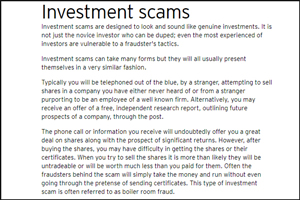Institutional Investment Scams
Scams related to institutional investment are quickly becoming the talk of the town. In these types of scams, fraudsters target smaller institutions such as colleges, schools, small businesses, and mid-sized firms by sending phishing emails and swindling their money. Scammers often pose as investment consultants or intermediaries and attempt to extract funds from these institutions or corporations. Once these institutions trust their claims and deposit money, the scammers disappear in the blink of an eye. These scammers use both traditional and modern methods to lure funds, including share sale fraud, pyramid or Ponzi schemes, and pension-related frauds. They often use persuasive and attractive language in their emails or letters to make their offers seem genuine and lucrative.
Institutional investment scams are elaborate and deceptive schemes specifically targeting entities such as pension funds, endowments, and large investment firms. These scams exploit the complexity of institutional investments, which often involve substantial sums of money. Perpetrators employ various tactics, including presenting fake investment opportunities that promise exceptionally high returns. They may use sophisticated fraud strategies involving complex financial instruments or convoluted investment plans to mislead institutional investors. Impersonation of reputable financial institutions, fund managers, or professional advisors is another common method used to build trust. Phishing attacks are also prevalent, where scammers send deceptive emails or messages to compromise accounts or steal sensitive data. In many cases, institutional investment scams take the form of Ponzi schemes, where funds from new investors are used to pay returns to earlier participants, creating the illusion of a legitimate and profitable investment.
In the past, hundreds of small firms were cheated by scammers, with estimated losses amounting to thousands of dollars. Institutions should delete these types of phishing emails immediately after reading them and escalate the matter to the police or cybercrime cell. Numerous well-known scams related to institutional investments have occurred in the United States, and corporate houses must exercise caution when opening emails from third parties. To lure the public, scammers often promise attractive interest rates on deposits—claims that are purely fictional, as their primary objective is to swindle money.
These scams frequently involve high-pressure tactics intended to rush investment decisions without allowing time for proper due diligence. To protect against institutional investment scams, it is critical for institutional investors to conduct thorough background checks, independently verify the legitimacy of any investment opportunities, and establish secure communication channels. Seeking independent validation from reputable sources, financial analysts, or regulatory bodies is essential when navigating the complex world of institutional investments. Institutional investors should prioritize ongoing education for their staff to ensure they are well-equipped to recognize and prevent investment fraud. It is important to foster a culture of skepticism and diligence to detect red flags early and minimize risk. Reporting any suspected fraudulent activity to the appropriate financial authorities not only helps protect institutional assets but also contributes to the broader fight against financial fraud. In an environment where financial sophistication is essential, institutional investors must stay vigilant, adapt to evolving scam tactics, and remain committed to the highest standards of security and due diligence to protect their assets and maintain stakeholder trust.
Scams related to institutional investment consulting are also on the rise globally. Scammers may pose as well-known investment consultants and make phone calls to prominent institutions. Their voices are often extremely professional, and their tone exudes maturity and credibility. If companies fall for their pitch, these scammers can extract sensitive information and quickly steal funds. Institutions can safeguard their assets by following the guidelines outlined below.
-
Show caution when opening emails from third parties or foreign countries.
Scammers often attract potential victims by making false promises and offering unusually high interest rates on investments. Never trust such emails or claims without conducting thorough background verification. Legitimate banks and financial institutions that accept public deposits typically offer only nominal interest rates. Therefore, if someone is offering significantly higher returns, it is likely a phishing attempt. Never share sensitive information such as passwords, PINs, Social Security Numbers (SSNs), or bank account details with anyone. Report such scamming activities to the police or cybercrime authorities immediately.







